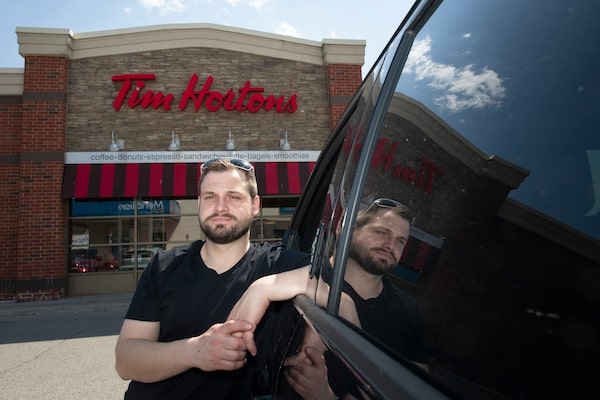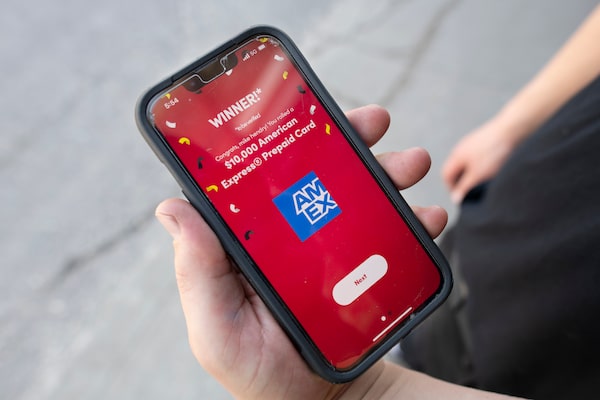
Michael Hendry outside a Tim Hortons coffee shop in Whitby, Ont. on April 12. He was frustrated after being told his $10,000 'win' would be replaced with a $50 gift card, but was able to shrug it off.Fred Lum/The Globe and Mail
Joel Hudman was sitting at the Timmie’s parking lot in Fergus, Ont., with a steeped tea and a chocolate glazed doughnut.
Sarah Smith had just arrived at the Kentville, N.S., hospital where she works, clutching her steeped tea.
And Scott Adams, a long-haul truck driver, was not far from the Canada-U.S. border in B.C., holding in his hand his last “Canadian” coffee of the day: medium, black, the same order since he was a teenager.
Each of them on that Monday morning last month was met with the same staggering news: “Winner! Congrats!” the message on the Tim Hortons app read. A $10,000 prize.
“I was so excited,” said Luc Massé, a Shediac, N.B., paramedic. He screenshotted the image and sent it to his wife.
In Whitby, Ont., delivery driver Michael Hendry was so giddy he could barely focus on his driving: “It took me two extra hours to finish my shift,” he said.
In the exhilaration of the moment, few of them stopped to deliberate the asterisk next to the word “winner”: The small print that said “to be verified.”
It was only later that they would learn the weight of that disclaimer.
Their “win,” Tim Hortons said, was not real but rather the result of a glitch in the app. Mr. Hudman, Ms. Smith, Mr. Adams, Mr. Hendry and Mr. Massé – along with an unknown number of others across the country – were all told that a technical error had sent them an incorrect message. They would each be given, instead, a $50 gift card.
The news made headlines across the country. The “winners” were, understandably, upset. A few made angry online posts and threatened boycotts. Others still talked with lawyers. Many pointed to the US$1.7-billion in revenue that parent company Restaurant Brands International brought in last year.
“We are very sorry that a technical glitch spoiled the first few hours of the contest,” Tim Hortons said. “We are truly very sorry for their disappointment.”

A screen capture of what was thought to be a prize-winning notification on Michael Hendry’s mobile phone.Fred Lum/The Globe and Mail
Over its 37-year history, the annual Roll Up the Rim to Win contest has grown into a beloved tradition – as iconically Canadian as Cowichan sweaters, maple syrup and, well, Tim Hortons. (This in spite of the fact that RBI has, since 2014, been majority owned by Brazilian company 3G Capital.)
Each year, millions of Canadians would look forward to the contest period where their morning coffee came with it a chance to win a car, cash or – as is far more often the case – another coffee. After Tim Hortons announced in 2020, at the onset of the pandemic, that the contest was going digital, some declared it dead – the fun was over, another cherished tradition ruined. But even after the contest moved onto the app, even after there were no more rims to be rolled, millions kept playing.
“It’s the anticipation of winning, right?” Mr. Massé said. “You know realistically you’re not going to. But you’re still dreaming of that small chance.”
Tim Hortons has not revealed the number of people who were mistakenly told they’d won. Each disappointment, though, landed differently. In a country as vast and disparate as Canada – where the yawning gap between rich and poor has only been exacerbated by rising costs, and record inflation – $10,000 is relative.
Mr. Hendry, the 30-year-old Whitby driver, makes $80,000 a year delivering bread. He’s frustrated, but has been able to shrug it off in the weeks since. The $10,000 would have been nice, he said with an exasperated laugh: “But I’m pretty easygoing.”
But for Mr. Hudman, that amount of money won’t be easily forgotten. The 39-year-old is an apprentice steamfitter who makes $26 an hour. He recently moved his family to Fergus because they could no longer afford nearby Guelph. The family, he said, lives paycheque to paycheque.
He wanted to take his wife and three boys on a vacation. They’ve never left Canada before. He himself has only travelled abroad once, to Mexico. He calls that one of the best weeks of his life.
“I was hoping to do something like that for my family,” he said.
Scott Adams, a long-haul truck driver, in a Tim Hortons parking lot in Coldbrook, N.S. on April 10. Adams was one of the Tims' customers who were mistakenly told they had won $10,000 in the Roll Up The Rim to Win contest last month.DARREN CALABRESE/The Globe and Mail
And for Mr. Adams, the long-haul truck driver, the two days where he thought he’d won were the lightest he’s felt in a long time. It was a brief reprieve from the constant weight of his debt – much of it from purchasing a new truck last year that’s since turned out to be a money pit.
All of them described themselves as loyal customers.
Mr. Hendry’s father was a bread delivery driver, too. He’d sometimes let his son ride along, and the two would stop at Timmie’s together for a treat.
Ms. Smith used to work at Tim Hortons. From the time she was 16 until college, she worked her way up from cashier to night shift supervisor.
And until recently, Mr. Adams would drink up to nine Tim’s coffees a day. It was a comfort during long trips away from home. Every Christmas Eve, he made it a point to buy one to reheat for himself the next morning, when the coffee shop would be closed.
The loyalty came from a place that felt personal. Mr. Hudman described the Timmie’s commercials he saw growing up, showing people in hard hats, hockey parents huddled around a rink – ordinary, hard-working people like him.
“Rich execs don’t go to Tim Hortons,” he said. “Lower-middle class, and lower-class – we go to Tim Hortons.”
So to him, it feels like a betrayal. A clarifying moment in a world of winners and everyone else who can’t seem to catch a break: “It seems like it’s always the rich get richer and the poor gets screwed.”
Ms. Smith, who used to work for Tim Hortons, said a small part of her blames herself.
“I should have known,” she said. “This kind of thing never happens to people like me.”